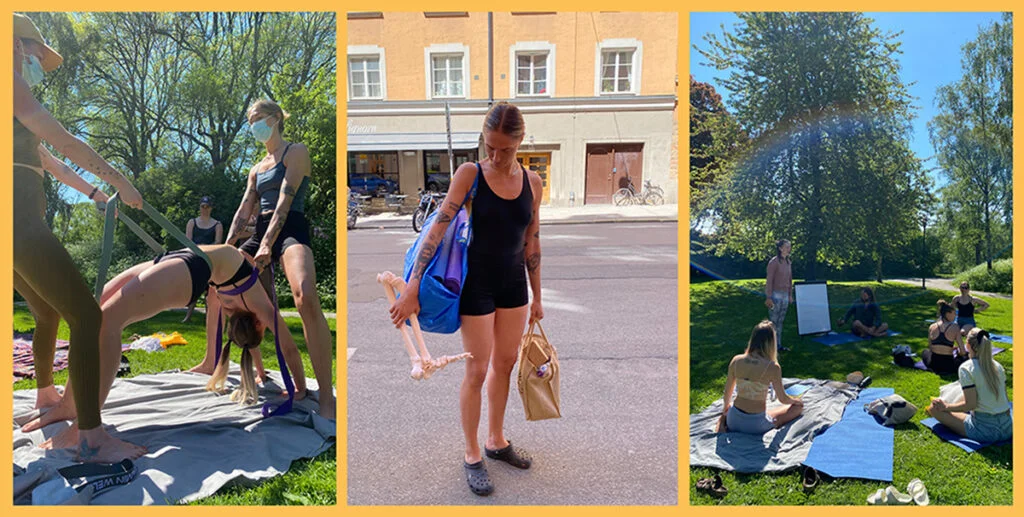
Modules
Modules
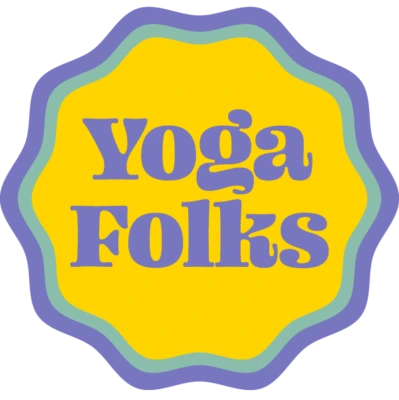
Dates 2025 TBA
The Body
Dates 2025 TBA
The Breath
23 – 26 May
The Mind
4 – 8 September
The Wisdom
13 – 17 November
The Bliss
+ 2 online trainings
The Upanishads
& The Yoga Sutras
Yoga Folks Studio
Åsögatan 166
Möllan Retreat Place
Småland
You can start this training at any time during the year.
60 000 kr
You get a 50% discount on our memberships while in the training
All Yoga Folks graduates get a discount of 5.000 SEK
Payment can be made in instalments
You can take all the modules individually, read more about each course here. (except for The Yoga Sutras, closed for 300 hour students only)
Take the next step in your yoga journey with our Advanced Yoga Teacher Training in Stockholm. Rooted in inclusivity, self-exploration, and the Vinyasa Krama tradition, this training supports your growth as a student and teacher.
You’ll refine your skills in asana cueing, deepen your pranayama practice, strengthen your meditation, and explore subtle body awareness in a safe, creative, and professional environment.
We follow a unique structure based on the Five Koshas, moving layer by layer toward your innermost self. This journey leads to a state of deep inner bliss. Our curriculum blends the four pillars of traditional yoga:
Devotional practices like chanting, rituals, and ceremony connect us to the divine.
Each day begins with a 2-hour morning practice of asanas, pranayama, mudra, mantra, and meditation. Throughout the training, you’ll engage in lectures, interactive sessions, and group discussions that reinforce active learning.
This Advanced Yoga Teacher Training totals 300 hours and is divided into five immersive modules. You’ll also participate in two online courses and complete a group project. Here’s what you can expect:
Upon completing each module, you’ll receive a course certificate. Finish all components to qualify as a certified 300-hour graduate. Those who completed their 200-hour training with us can also receive a 500-hour Yoga Folks Certificate.
This program is both professional and deeply human. It’s a place to grow, reflect, and refine your voice as a teacher. You’ll walk away with practical tools, philosophical grounding, and renewed inspiration.
We’re honored to walk this path with you.
It’s going down
Gems & jewels in the learning chambers Tap, click, or high-five each topic to find out more about what we will be exploring throughout the training.

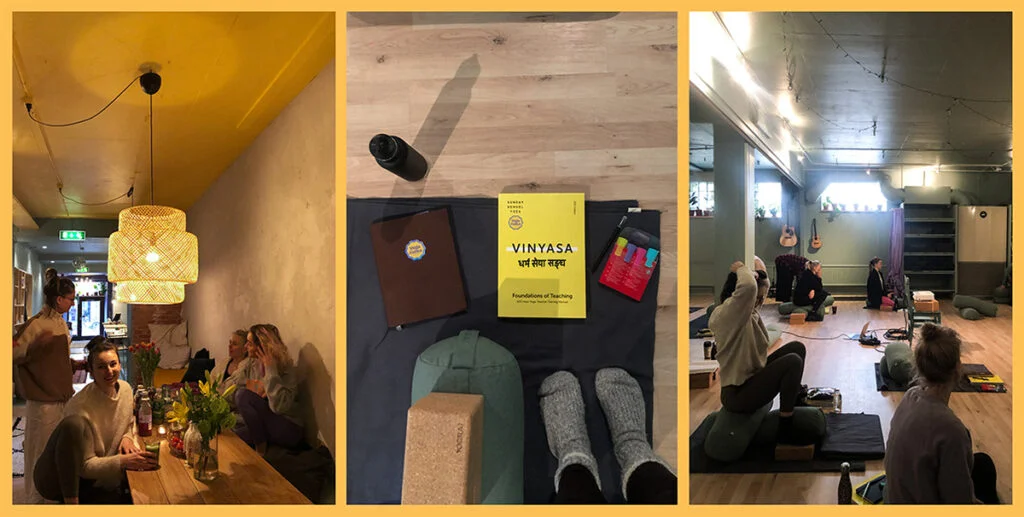
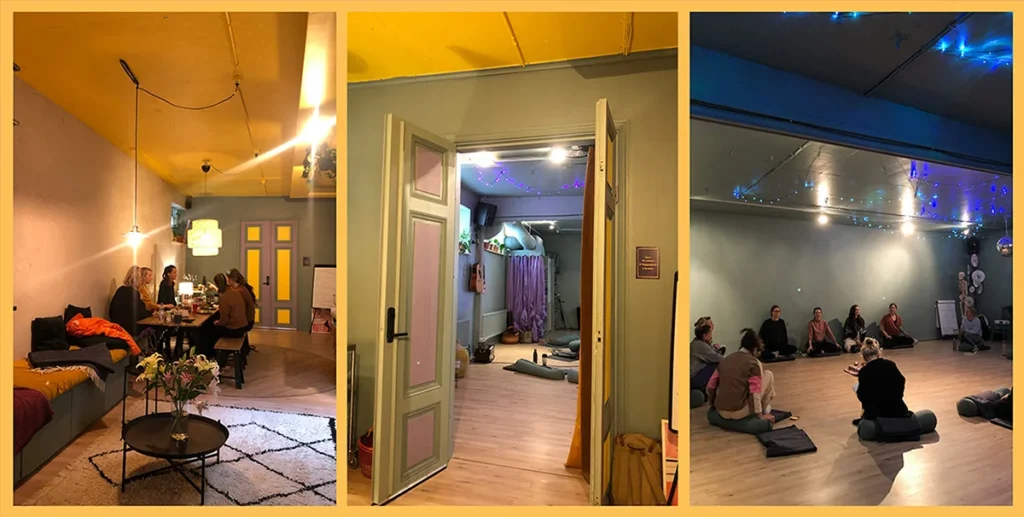
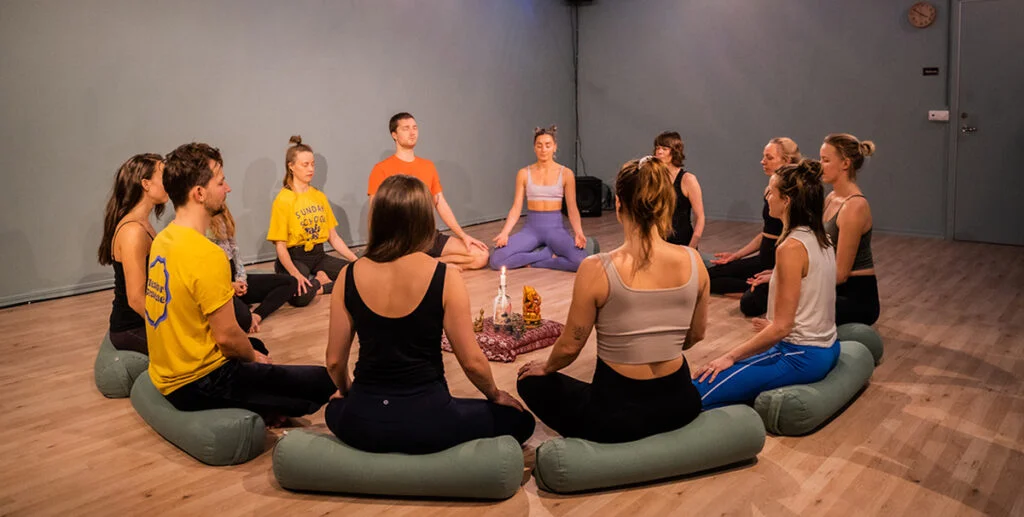
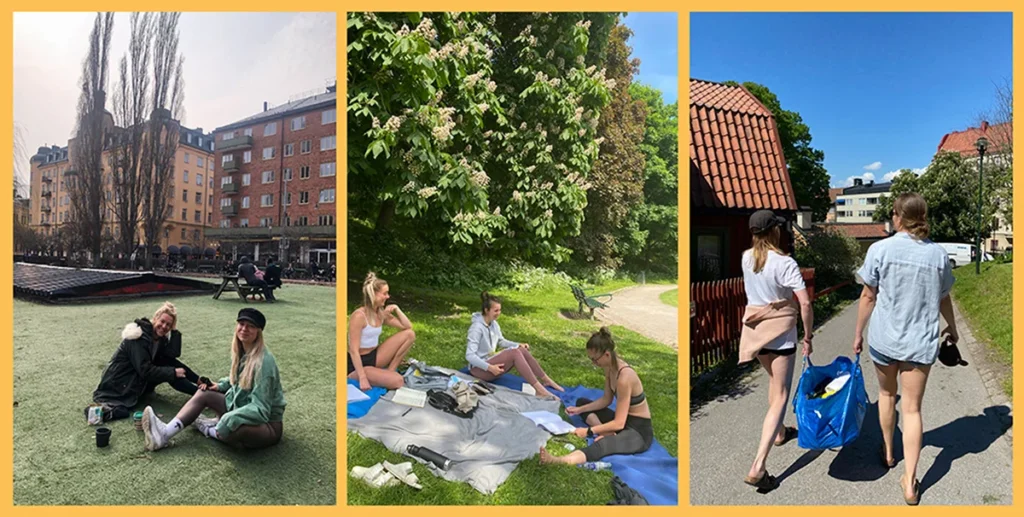

1. The Body
Dates 2025 TBA
Wednesday to Friday 06:30-17:30 Saturday 07:30-18:00 Sunday 07:30-16:00 + prep work ca 8-10 hrs to complete online before start of the module
Get ready for a 5-day Advanced Yoga Teacher Training that’s anything but ordinary. This immersive experience invites you to roll up your sleeves and dive into the dynamic world of Vinyasa Krama Yoga.
Throughout the week, we’ll explore the art of hands-on assisting, study anatomy in motion, and break down yoga poses—from foundational shapes to more complex variations. Each part of the journey is designed to build confidence, skill, and clarity.
As teachers, we believe it’s not just about memorizing techniques. It’s about guiding an inner journey for your students. This module combines alignment principles with embodied wisdom, helping you become a more intuitive and impactful teacher.
By the end of this Advanced yoga teacher training, you’ll feel more confident in assisting, have a stronger grasp of functional anatomy, and deepen your understanding of yogic philosophy.
HERE’S WHAT’S ON THE SCHEDULE:
2. Study of Upanishads
Started March
Online zoom course with Josephin, the timing for the course will be set together with the group closer to the start of the training. It’s a 12 week course, where you meet every 2 weeks (=6 sessions) over zoom for 90 min per session.
HERE’S WHAT’S ON THE SCHEDULE:
Studying the Vedas and Upanishads is like opening a treasure chest filled with cultural, spiritual, and philosophical gems. These ancient texts offer more than just historical context—they serve as powerful guides for navigating life with clarity and purpose.
We’ll explore key concepts such as Brahman, Atman, Karma, Prakriti, and Pranava. Each idea offers timeless wisdom that remains highly relevant today. While the language is ancient, the insights are deeply practical. Think of the Upanishads as a spiritual manual that helps you understand your inner world—and live more meaningfully in the outer one.
In this Advanced yoga teacher training, you’ll gain a fresh perspective on familiar questions. You’ll also discover how these teachings can support your practice, your teaching, and your daily life.
We will study the following texts:
Katha
Kena
Isha
Mundaka
Prasna
Taittiriya
Chandogya
Brihadaranyaka
Mandukya
Aitareya
Svetasvatara
3. The Breath
Dates 2025 TBA
Thursday & Friday 6:30-17:30
Saturday 7:30-18:00
Sunday 7:30-16:00
+ prep work ca 4-5 hours to complete online before the start of the module
Take a moment to reflect on the power of your breath.
In this module, we explore the transformative effect of conscious breathing. You’ll examine how breath works, why it matters, and how it supports physical, emotional, and mental well-being.
Through timeless pranayama techniques and a dedicated sadhana, you will be introduced to a variety of breathing practices. Each one is designed to help you create balance, focus, and presence both on and off the mat.
The module also includes a deeper look into breath physiology and modern breathwork approaches. You’ll gain clarity on their differences and how to apply both in your own practice and teaching.
In parallel, we begin studying Sanskrit. You’ll learn the basics of pronunciation and structure, building a stronger connection to the roots of the practice.
By the end of this module, you’ll be equipped to lead pranayama classes, design breathing-focused programs, and maintain a meaningful personal practice.
HERE’S WHAT’S ON THE SCHEDULE:
4. The Mind
23 – 26 May
Thursday & Friday 6:30-17:30
Saturday 7:30-18:00
Sunday 7:30-16:00
+ prep work ca 7 hours to complete online before the start of the module
This four-day immersion is an invitation to explore the connection between body and mind. In this module, we focus on active meditation, voice work, and the creative flow of yoga sequencing. Together, we’ll expand your teaching and enrich your personal practice.
Meditation is more than stillness. It can also be dynamic, expressive, and alive. During this module, you’ll experience diverse techniques—ranging from rhythmic shaking and spontaneous movement to the deeper layers of OSHO meditation.
Voice is another central theme. With guidance from voice therapist Kim Gajraj, you will explore tone, presence, and self-expression. Her work supports your ability to speak with clarity and authenticity, both on and off the mat.
This module also dives into sequencing and teaching structure. We’ll explore how to build classes and workshops that feel intentional, balanced, and fully yours. Using tools from philosophy and anatomy, you’ll learn how to design impactful learning spaces and refine your cueing.
We hold this learning space with both professionalism and warmth. It’s a chance to learn, reflect, and grow within a supportive group of fellow teachers.
You’ll leave this module equipped to teach a wide variety of meditation styles. You’ll also gain the tools to create intelligent, well-rounded sequences and develop more confidence in your voice as a teacher.
HERE’S WHAT’S ON THE SCHEDULE:
5. The Wisdom
4 – 8 September
Wednesday – Friday 6:30-17:30 Saturday 7:30-18:00 Sunday 7:30-16:00 + prep work ca 7 hours to complete online before the start of the module
This module invites you to explore the depth of meditation and the path to focus and presence. Led by Josephin, this journey supports you in developing the inner steadiness needed to teach meditation with confidence and clarity.
To teach focus effectively, we first need to develop a personal relationship with it. That is why meditation is at the heart of this module. You will explore its meaning, techniques, and purpose through different lenses, including Eastern Yoga, Buddhism, and Western psychotherapy.
Each day includes guided practices such as mantra, yantra, mudra, and Vedic meditation. These techniques help you build a grounded and personal approach, one you can integrate into your teaching.
At the same time, we explore the connection between meditation and mental health. With the guidance of Ida Farneman, you will learn how to teach trauma-informed practices, understand stress and its impact, and examine how the nervous system shapes our inner experience.
In addition, you will participate in 25 hours of Yin Yoga with Sammy Furnival. This practice brings new insights into connective tissues, meridians, and the relationship between movement and mind.
By the end of this module, you will feel ready to teach seated meditation classes, design sessions that address stress and nervous system regulation, and offer support with greater awareness and care.
HERE’S WHAT’S ON THE SCHEDULE:
6. Study of Yoga Sutras
Start September
Online zoom course with Satyadev, the timing for the course will be set together with the group closer to the start of the training. It’s a 12 week course, where you meet every 2 weeks over zoom for 90 min per session. HERE’S WHAT’S ON THE SCHEDULE:
7. The Bliss
13 – 17 November
Möllan Retreat
Starting Wednesday 16:00, so there is time for you to travel to Småland during the day. We end on Sunday around noon, for you to make it home in good time for dinner. A day will look something like this: 06:30-08:30 Morning practice 08:30-09:30 Breakfast 09:30-13:00 Lectures & classes 13:00-15:00 Lunch & sauna, time to wander to forest and rest 15:00-18:30 Lectures & classes 18:30-20:00 Dinner 20:00-20:30 Rituals and storytelling Approximately 8 hours of online prep work to be completed before the start of the module.
Together with Josephin and guest teacher Satyadev, you’ll explore yogic philosophy through the lens of Vedanta and self-inquiry. His presence brings depth through satsangs, mantra chanting, and ritual-based discussions that root the teachings in experience.
In preparation for this journey, you’ll begin a kriya practice three weeks before arriving at the retreat. During the stay, the practice continues—supporting a steady, meditative rhythm throughout the days.
Evenings invite you into stillness and meaning, with storytelling and group reflections inspired by the energies of Matangi and Kamala, two transformative goddesses from the Tantric tradition.
By the end of this module, you will feel more confident in sharing yogic philosophy, self-inquiry practices, and the deeply healing methods of Restorative Yoga and Yoga Nidra.
HERE’S WHAT’S ON THE SCHEDULE:
Apply Now
All you need to take the first step is to send us an application, and we’ll go on from there! The application is not binding. We will be in touch after submitting the form, to take the necessary steps to make sure that this Advanced Yoga Teacher Training is right for YOU. Arriba, on y va!